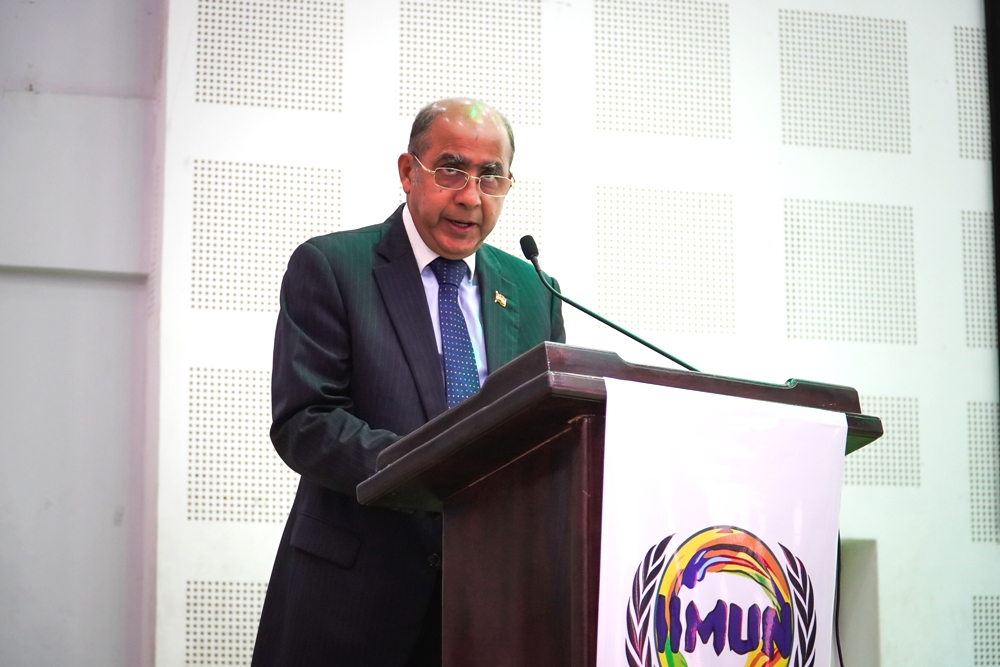
Former diplomat Jitendra Nath Misra speaking during the
inaugural function of IIMUN Kohima Conference at G Rio School.
- KOHIMA — Former diplomat Jitendra Nath Misra on
Thursday warned students about the dangers of digital distractions and urged
them to cultivate a reading habit grounded in literature, philosophy, and
history.
- Addressing the inaugural function of India’s International
Movement to Unite Nations (IIMUN) Kohima Conference, held at G Rio School,
Misra described social media as a compulsive distraction “in these troubled
times.”
- Advising students against reading only from screens or
engaging excessively on social platforms, he said that knowledge doesn’t come
from cell phones or computers but from reading, imagining, and perceiving.
- He stressed the importance of imagination alongside
curiosity and called on parents to find a balanced approach in managing their
children’s screen time. “If you are denied something, you become desperate to
do it. So you need a balance—not too much, not too little,” he said.
- Misra also encouraged teachers to foster environments where
students can challenge them, saying: “The more they challenge you, the better
you become as a teacher.”
- Secularism and
national identity
- Minister for Power and Parliamentary Affairs KG Kenye, who
also addressed the gathering, spoke about the significance of hosting an
international movement in the state and the enduring challenge of secularism
across the globe. He noted that while India is a land of diversity, the ongoing
struggle in geo-religious contexts remains one of humanity’s most difficult
issues.
- Kenye reminded that religious wars have taken many forms
throughout history. Even in a free country like India, where all religions are
respected, it remains a serious challenge, he said.
Also read: Assam Rifles DG meets Chief Minister Neiphiu Rio, reviews operational readiness in Nagaland
- Henok Buchem, Deputy Commissioner of Kohima, highlighted the
importance of critical thinking in today’s information-saturated world. “We are
constantly bombarded with information, opinions, and claims—but not everything
we read is accurate or trustworthy,” he cautioned.
- Buchem underlined the importance of evaluating evidence,
analysing information objectively, and reaching informed conclusions.
- Youth health concerns
- Dr. Nukshisangla Lemtur, Joint Director of Nagaland State
AIDS Control Society, presented a sobering picture of health challenges facing
adolescents and youth in Nagaland. She revealed that between 15-19% of HIV
cases in Nagaland over the past three years were found in the 15-24 age group,
with over 86% of cases attributed to heterosexual transmission.
- Nationally, she said, 31% of people living with HIV fall
within the 15-29 age bracket. Citing National Family Health Survey-5 data
(2020–21), she said 6.8% of women aged 15-19 in India had already been pregnant
or had given birth—a factor contributing to maternal health risks like anaemia,
premature birth, and social stigma.
- Lemtur also highlighted the growing burden of mental health
disorders, teenage pregnancies, school dropouts, and communicable and
non-communicable diseases among youth.
- She shared that depression and anxiety are among the leading
causes of illness and disability in adolescents, and suicide remains one of the
top causes of death in the 15-19 age group.
- Citing national data, the doctor said that 1 in 20 people
suffer from depression, while 0.9% face a high suicide risk. Additionally,
around 60 million Indians suffer from mental illness.
- Further, she said that rising obesity is another concern,
with over 5% of Indian adolescents classified as overweight or obese, and some
states reporting rates as high as 10-15%.
- Lemtur advocated for greater access to affordable and
comprehensive healthcare services for adolescents, particularly mental health
support. She pointed to “CITY BARN,” a youth-friendly health initiative
launched in Kohima near Bayavu Junction, which provides a holistic range of
services for young people.
- The model, piloted in Nagaland, has been recognised and
appreciated by NACO (National AIDS Control Organisation).
- She urged the youth to be proactive about their health and
to seek help for issues such as learning problems, abuse, early sexual
experimentation, and mental health challenges.
- Students and faculty from Music Academy Kohima and G Rio
School presented musical performances.
